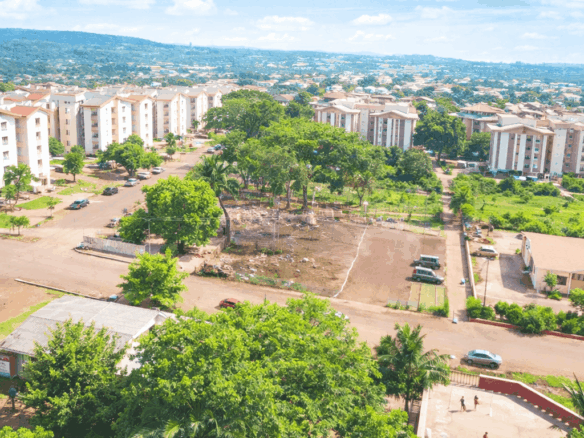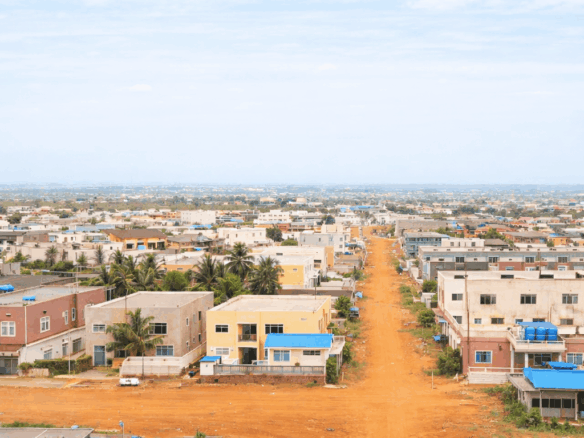Are you looking to diversify your investment portfolio and tap into the exciting world of real estate in Ghana? With its growing economy, rising middle class, and increasing demand for housing, Ghana’s property market offers a wealth of opportunities for savvy investors. However, navigating this dynamic landscape also requires a keen understanding of the potential risks involved. In this blog post, we’ll explore how to balance the risks and rewards of real estate investment in Ghana to maximise your gains.
Overview of Ghana’s Real Estate Market
Ghana’s real estate market has been on an upward trajectory in recent years, driven by factors such as rapid urbanization, a growing population, and government initiatives to attract foreign investment. The market offers a range of options, from residential properties like apartments and houses to commercial spaces like offices and retail centres. With competitive prices compared to other African markets and the potential for high rental yields, Ghana has become an increasingly attractive destination for property investors.
The Rewards of Investing in Ghana’s Real Estate Market
-
High ROI Potential:
One of the most compelling reasons to invest in Ghana’s real estate market is the potential for high returns on investment. Property values have been steadily rising, particularly in urban centres like Accra and Kumasi, offering the opportunity for significant capital appreciation over time. Additionally, rental yields in Ghana are among the highest in Africa, with some properties generating returns of 10% or more per year.
-
Growing Urbanisation:
Ghana’s rapid urbanisation is a key driver of demand in the real estate market. As more people migrate to cities in search of job opportunities and better living standards, the need for housing and commercial spaces continues to grow. This trend is expected to persist in the coming years, providing a solid foundation for long-term property investment.
-
Affordable Entry Point:
Despite its growth potential, Ghana’s property market remains relatively affordable compared to other global destinations. This lower entry point allows investors to acquire properties at competitive prices, maximising their potential returns. Whether you’re looking for a single apartment or a larger development project, Ghana offers options to suit a range of budgets.
-
Government Support:
The Ghanaian government has taken steps to create a more favourable environment for real estate investment. This includes offering tax incentives for developers, streamlining land registration processes, and implementing policies to attract foreign investors. These measures demonstrate the government’s commitment to supporting the growth of the real estate sector and provide added confidence for those looking to invest.
The Risks of Real Estate Investment in Ghana
While the rewards of investing in Ghana’s property market are significant, it’s crucial to also understand and mitigate the potential risks involved:
-
Land Ownership Challenges:
One of the most significant risks in Ghana’s real estate market is the issue of land ownership and title disputes. In some cases, multiple parties may claim ownership of the same piece of land, leading to legal complications and potential losses for investors. To mitigate this risk, it’s essential to conduct thorough due diligence on any property before making a purchase, including verifying the legitimacy of land titles and working with reputable legal professionals.
-
Economic Volatility:
Like any emerging market, Ghana’s economy can be subject to volatility and uncertainty. Factors such as inflation, exchange rate fluctuations, and changes in government policies can impact the real estate market and affect the value of investments. To navigate these risks, it’s important to have a long-term investment horizon and to diversify your property portfolio across different locations and types of properties.
-
Regulatory Hurdles:
Navigating the regulatory landscape in Ghana can sometimes be challenging, particularly for foreign investors. Obtaining necessary permits and approvals for development projects can be a lengthy and complex process, potentially leading to delays and additional costs. To mitigate these risks, it’s advisable to work with local partners who have experience in navigating the regulatory environment and to factor in potential delays when planning your investment timeline.
-
Market Saturation in Certain Areas:
While Ghana’s property market as a whole offers strong potential, it’s important to be aware of the risk of over-investment in certain highly populated areas. In locations where development has been particularly intense, such as parts of Accra, there may be a risk of market saturation leading to lower rental yields and slower capital appreciation. To mitigate this risk, consider diversifying your investments across different regions and exploring emerging locations with strong growth prospects.
Mitigating Risks While Maximising Rewards
While the risks outlined above are significant, there are strategies investors can employ to mitigate them and maximise their potential rewards in Ghana’s real estate market:
-
Partner with Trusted Professionals:
One of the most effective ways to navigate the complexities of Ghana’s property market is to work with reputable real estate professionals. Platforms like Ghana Property Finder offer a wealth of listings and connect investors with trusted agents who can provide valuable guidance on the local market. By leveraging the expertise of experienced professionals, investors can make more informed decisions and avoid potential pitfalls.
-
Conduct Thorough Due Diligence:
Before making any investment, it’s crucial to conduct comprehensive due diligence on the property in question. This includes verifying land titles, assessing the condition of the property, and researching the local market dynamics. While this process can be time-consuming, it’s an essential step in mitigating risks and ensuring the viability of your investment.
-
Stay Informed on Market Trends:
To make sound investment decisions, it’s important to stay up-to-date on the latest trends and developments in Ghana’s real estate market. This includes monitoring economic indicators, government policies, and shifts in consumer preferences. By staying informed, investors can identify emerging opportunities and adjust their strategies accordingly.
-
Consider Long-Term Horizons:
Real estate investment is often most successful when approached with a long-term perspective. While short-term fluctuations in the market can be concerning, investors who are able to weather these ups and downs and hold their properties for the long haul are often rewarded with significant capital appreciation over time. By maintaining a patient, long-term outlook, investors can maximise their potential returns while minimising the impact of short-term risks.
Long-Term Outlook for Real Estate Investment in Ghana
Despite the challenges outlined above, the long-term outlook for real estate investment in Ghana remains positive. The country’s growing economy, rising middle class, and increasing demand for housing all point towards sustained growth in the property market over the coming years. As infrastructure continues to improve and the government takes steps to support the real estate sector, investors who are able to navigate the risks and identify strategic opportunities stand to reap significant rewards.
Looking ahead, some of the most promising areas for real estate investment in Ghana include:
-
Affordable Housing:
With a significant housing deficit and a growing population, there is a strong demand for affordable housing options in Ghana. Investors who are able to develop projects that cater to this segment of the market may find strong potential for both rental yields and capital appreciation.
-
Student Accommodation:
As Ghana’s education sector continues to expand, there is a growing need for student housing near universities and colleges. Investing in purpose-built student accommodation can offer a reliable stream of rental income and the potential for long-term capital growth.
-
Luxury Apartments:
While the affordable housing segment offers significant opportunities, there is also strong demand for high-end, luxury apartments in prime locations like Cantonments and East Legon. These properties cater to Ghana’s growing upper-middle class and expatriate communities, offering the potential for premium rental yields.
Conclusion
Real estate investment in Ghana offers a compelling mix of risks and rewards for those who are able to navigate this dynamic market. By understanding the potential challenges, conducting thorough due diligence, and partnering with trusted professionals, investors can position themselves to maximise their returns while minimising their exposure to risk.
As Ghana’s economy continues to grow and its property market matures, the opportunities for strategic real estate investment are only set to increase.
If you’re considering investing in Ghana’s real estate market, Ghana Property Finder is your ultimate resource. Our platform offers a wide range of listings across the country, connecting you with trusted agents who can provide valuable insights and guidance. Whether you’re a first-time investor or an experienced professional, we’re here to help you navigate the risks and unlock the rewards of real estate investment in Ghana.
5 FAQs About Real Estate Investment in Ghana
-
What are the most popular areas for real estate investment in Ghana?
Some of the most popular areas for real estate investment in Ghana include Accra, Kumasi, Takoradi, and emerging locations like Kasoa and Pokuase. Within Accra, prime locations include East Legon, Cantonments, and Airport Residential.
-
What types of properties offer the highest potential returns in Ghana?
The types of properties with the highest potential returns can vary depending on the location and market dynamics. However, some of the most promising segments include affordable housing, student accommodation, and high-end luxury apartments in prime locations.
-
How can foreign investors navigate the legal requirements for purchasing property in Ghana?
Foreign investors looking to purchase property in Ghana should work with reputable legal professionals who can guide them through the process. This includes verifying land titles, drafting purchase agreements, and ensuring compliance with relevant regulations.
-
What are some of the most important due diligence steps when investing in real estate in Ghana?
Key due diligence steps include verifying land titles, assessing the condition of the property, researching the local market dynamics, and understanding the regulatory requirements for development projects. Working with trusted real estate professionals can help ensure a thorough due diligence process.
-
What is the long-term outlook for Ghana’s real estate market?
The long-term outlook for Ghana’s real estate market remains positive, driven by factors such as economic growth, urbanization, and increasing demand for housing. While short-term challenges may arise, investors who are able to take a patient, strategic approach stand to reap significant rewards over the long term.
Start exploring the exciting world of real estate investment in Ghana today. Visit Ghana Property Finder to browse our extensive listings, connect with trusted agents, and unlock the potential of this dynamic market. Your journey to real estate success starts here.






